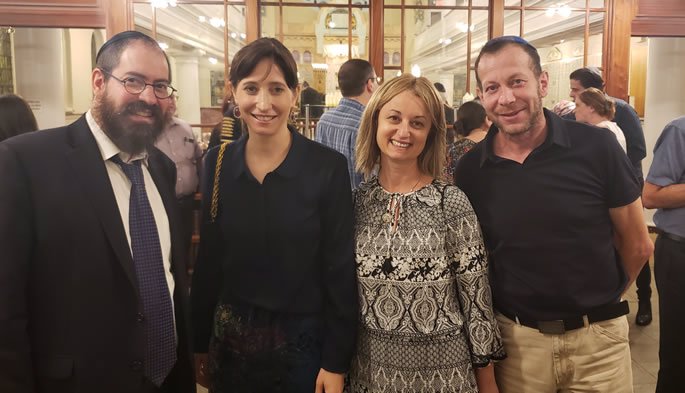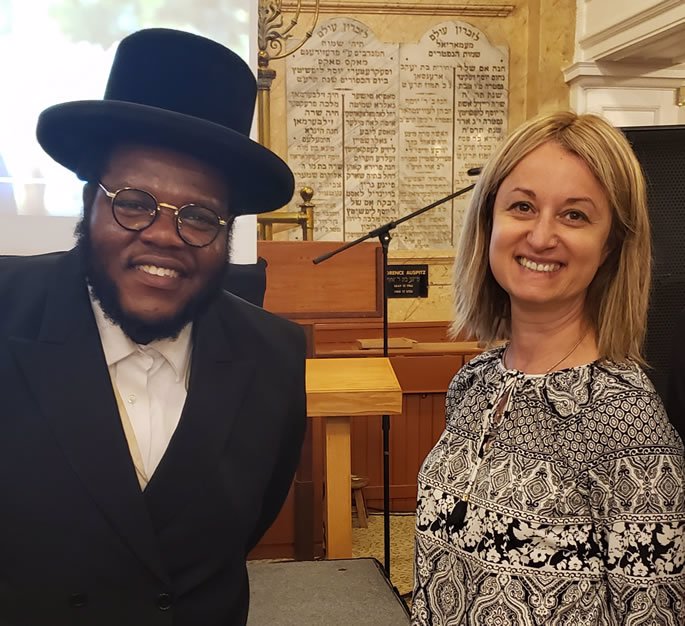A famous proverb states, “All roads lead to Rome.” After meeting American-Israeli rapper Nissim Black and hearing his story, I realized that all roads do lead to one common destination—to the place where we connect to our true Source.
Growing up in the former Soviet Union, my childhood could not have been more different from Nissim’s formative years. I was singing and marching to Communist songs, while he was rapping on the streets of Seattle. My family suffered from anti-Semitism, his fromdrugs and violence. I struggled to fit into Soviet society, as Nissim navigated the complex world of street gangs. We were born exactly 10 years apart—both in the month of December—and despite all odds, we each followed our inner compass to discover a life of purpose.
This past summer, my husband and I attended an evening of inspiration at B’nai Abraham Chabad of Downtown Philadelphia. The event was organized by Rabbi Yochonon and Leah Goldman, emissaries of the Lubavitcher Rebbe. This year, the main attraction was none other than Nissim Black.
Nissim was born Damian Jamohl Black in 1986, into an African-American family. His parents, involved with music and hip-hop culture, separated when he was two. Despite the constant presence of guns, drugs and violence, Nissim tried to make sense of his life by joining different religions and contemplating his connection to G‑d.
His grandfather was a devout Muslim, so Islam was the first stop on his religious journey. At 13, after attending a summer camp, Nissim converted to Christianity. This was also the time he first started to rap.
At 17, Nissim released his first singles and gained popularity; however, in 2008, he got into a potentially violent altercation with another rapper. He has said that this life-threatening situation made him re-examine his priorities and started him on his path to Judaism.

As he started to read Jewish texts and listen to Torah classes on Chabad.org, he quickly found himself naturally connecting to what he was learning.
Eventually, Nissim and his wife, Adina, his high school sweetheart, both went through Orthodox conversion and moved back to his childhood neighborhood in Seattle. Five years after their original ceremony, Nissim and Adina married in an Orthodox marriage ceremony. After a long and complicated journey, they made aliyah to Israel with their six children.
“All of those journeys—being in a gang, being on the football team was a part of me trying to say, ‘I belong to something greater than myself, I don’t know where, but I belong somewhere,’ ” explained Nissim.
On his journey of return, Nissim feels a particularly strong connection to Chabad. “Not only did Chabad offer a safe place of learning and unconditional acceptance, but it provided support for ‘Nissim the performer.’ ”
When I asked what inspired him to try to find meaning and purpose in life, Nissim answered that what motivated him was “the innate search for truth. Since I was a kid, I was digging to find the root of everything. I think it was programmed into me to search for the truth.”
As I sat at his concert, I looked around the room, reminding myself that each person is on their unique journey.
Every person’s path is different. Some were shown the path by their parents. Forty-five years ago, Rabbi Goldman’s father, Rabbi Yossi Goldman, paved the way for his children when in 1976 his family was sent by the Lubavitcher Rebbe to serve as emissaries to the Jewish community of Johannesburg in South Africa.
Ever since childhood, Rabbi Goldman saw his parents’ example of devotion and connection, yet as an adult, he had to make his own decisions. Regardless where we come from, we all have to make our individual choices of how we want to live the one life we were given.
After the event, I reached out to the rabbi to seek his perspective on Nissim’s inspirational journey. Rabbi Goldman pointed out, “Despite the challenging circumstances of his troubled youth, Nissim was able to discover a deep faith in G‑d within his soul, which allowed him to transform the darkness of his past into the light of his future.”
Another point he emphasized was the fact that “Nissim recognized that G‑d gave him a gift, his musical talent. Rather than run away from it because it would remind him of his past, he has found a way to elevate the genre of hip-hop music by using this gift to inspire others with messages of positivity and joy.”
Chassidic wisdom teaches that each individual’s mission is to reveal an expression of G‑d’s Oneness in the world. This unity does not negate, but rather employs, our individual differences. Regardless of our singular journeys, when we encounter a fragmented world of darkness, and we seek to find G‑d’s light, we elevate our environment beyond its fragmented parts and restore the ultimate Oneness of the world.
We were sharing an evening of inspiration—a Soviet-born Communist woman, an African-American rapper and a rabbi from a Chassidic family—all sitting in one room, celebrating our Jewish heritage. Our unique roads led us back to the one and only true destination of connection with our Creator.
We always have a choice, and Nissim Black reassures us that even if one comes from a dark place, it is possible to make a decision and find the Light.
An American Rapper and a Soviet Child: Parallel Journeys of Return – Reflections (chabad.org)

